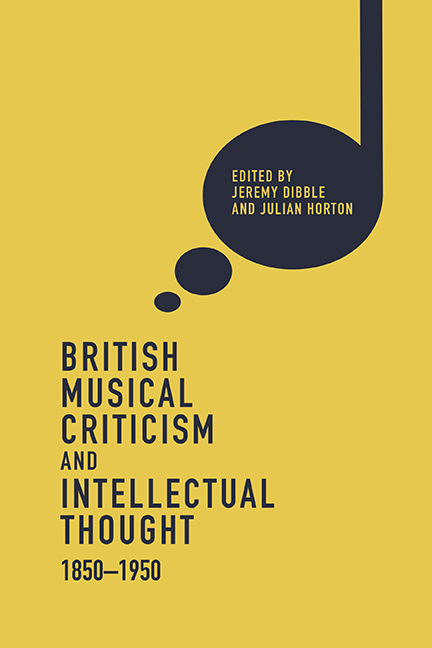Book contents
- Frontmatter
- Dedication
- Contents
- List of Illustrations
- List of Contributors
- Acknowledgements
- Introduction: Trends in British Musical Thought, 1850–1950
- 1 Avoiding ‘Coarse Invective’ and ‘Unseemly Vehemence’: English Music Criticism, 1850–1870
- 2 Spencer, Sympathy and the Oxford School of Music Criticism
- 3 Free Thought and the Musician: Ernest Walker, the ‘English Hanslick’
- 4 Ernest Newman and the Promise of Method in Biography, Criticism and History
- 5 ‘Making Symphony Articulate’: Bernard Shaw's Sense of Music History
- 6 Analysis and Value Judgement: Schumann, Bruckner and Tovey's Essays in Musical Analysis
- 7 The Scholar as Critic: Edward J. Dent
- 8 Russia and Eastern Europe
- 9 Anti-Intellectualism and the Rhetoric of ‘National Character’ in Music: The Vulgarity of Over-Refinement
- 10 Chosen Causes: Writings on Music by Bernard van Dieren, Peter Warlock and Cecil Gray
- 11 ‘Es klang so alt und war doch so neu’: Vaughan Williams, Aesthetics and History
- 12 Constant Lambert: A Critic for Today? A Commentary on Music Ho!
- 13 The Challenge to Goodwill: Herbert Howells, Alban Berg and ‘The Modern Problem’
- 14 Hans Keller: The Making of an ‘Anti-Critic’
- Select Bibliography
- Index
- Titles listed here were originally published
9 - Anti-Intellectualism and the Rhetoric of ‘National Character’ in Music: The Vulgarity of Over-Refinement
Published online by Cambridge University Press: 17 July 2019
- Frontmatter
- Dedication
- Contents
- List of Illustrations
- List of Contributors
- Acknowledgements
- Introduction: Trends in British Musical Thought, 1850–1950
- 1 Avoiding ‘Coarse Invective’ and ‘Unseemly Vehemence’: English Music Criticism, 1850–1870
- 2 Spencer, Sympathy and the Oxford School of Music Criticism
- 3 Free Thought and the Musician: Ernest Walker, the ‘English Hanslick’
- 4 Ernest Newman and the Promise of Method in Biography, Criticism and History
- 5 ‘Making Symphony Articulate’: Bernard Shaw's Sense of Music History
- 6 Analysis and Value Judgement: Schumann, Bruckner and Tovey's Essays in Musical Analysis
- 7 The Scholar as Critic: Edward J. Dent
- 8 Russia and Eastern Europe
- 9 Anti-Intellectualism and the Rhetoric of ‘National Character’ in Music: The Vulgarity of Over-Refinement
- 10 Chosen Causes: Writings on Music by Bernard van Dieren, Peter Warlock and Cecil Gray
- 11 ‘Es klang so alt und war doch so neu’: Vaughan Williams, Aesthetics and History
- 12 Constant Lambert: A Critic for Today? A Commentary on Music Ho!
- 13 The Challenge to Goodwill: Herbert Howells, Alban Berg and ‘The Modern Problem’
- 14 Hans Keller: The Making of an ‘Anti-Critic’
- Select Bibliography
- Index
- Titles listed here were originally published
Summary
As Europeans go, the English are not intellectual. They have a horror of abstract thought, they feel no need for any philosophy or systematic ‘world-view’.
A complete anesthesia to formal considerations is the most conspicuous common factor exhibited by English artists in every age and in every medium, and one which is shared by the public for which they create.
Vaughan Williams started his life as an academic composer which is practically equivalent to saying that the first influences to which he was exposed were Germanic.
THIS chapter makes a series of claims that should be stated at the outset. First, while we should be highly suspicious of the rhetoric of ‘national character’ in general, and of critical assessments of music based on notions of ‘Englishness’ in particular, the discursive strategies involved in these assessments provide a glimpse into ideological debates that have shaped musical culture and are therefore worth historicizing. Second, it is tempting to draw a causal link between the idea of anti-intellectualism in English national character on the one hand and the more recent narrative about the absence of ‘intellectuals’ in Britain on the other. The latter narrative arises from scepticism towards the close ties between British political and intellectual elites of the late-nineteenth and early-twentieth centuries (the so-called ‘intellectual aristocracy’) and infers from these ties the lack of a separate intelligentsia capable of providing a systematic critique of the prevailing social structure. This claim judges British thinkers against Continental models of the ‘intellectual’ – a comparison that seems to find the former complicit in maintaining social hierarchy. The comparison also assumes that political dominance must necessarily be conservative, pitted against radical dissent. Conversely, anti-intellectualism is typically cast as the preserve of the reactionary, the conservative and the philistine – a characterization that certainly resonates with the anti-intellectualisms of our own time. An examination of early twentieth-century British music criticism, however, suggests that, in fact, anti-intellectualism became a means to subvert dominant structures – in this case, professional and institutional monopolies – serving more radical and modernist ends than hereto acknowledged. Far from constituting a reactionary bid to sure up the status quo, I will suggest that musical thinkers used anti-intellectualism to link ideas about English national identity with a concern for aesthetic modernity, construed as distinct from Continental models of thought and practice, including the very model that associated the ‘intellectual’ with revolution.
- Type
- Chapter
- Information
- British Musical Criticism and Intellectual Thought, 1850–1950 , pp. 199 - 234Publisher: Boydell & BrewerPrint publication year: 2018



